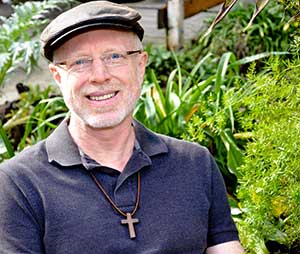
Tim Otto’s book Oriented to Faith: Transforming the Conflict over Gay Relationships was published as a result of his 2012 Pastoral Study Project, DIVERSITY WITHOUT DIVISION.
LI: Tim, tell us a little about your story.
TO: Like so many young, gay people from small towns, I moved to San Francisco to figure out my sexuality. I also wanted to join a commune called Sojourners (some San Franciscans said it only qualified as a “church community”). I introduced myself to the group by saying, “I’m gay and I’m a committed Christian. I don’t know how those go together, but I’d like to try to figure that out with you all.” Afterward, one of the pastors, Jack Bernard, told me “I don’t know what all I think about homosexuality, but I wonder if it isn’t a gift to you, and I know you are a gift to us.” Before that I had been trying to exorcise my gay sexuality from my body. But Jack’s counsel revolutionized my life. I began to think of my orientation as a gift from God to be stewarded.
That was November of 1989. It was the height of the AIDS crisis in the U.S., and I started volunteering at San Francisco General Hospital on the AIDS ward. Compelled by that work, I enrolled in nursing school and worked as an RN with AIDS patients for fourteen years. Years later, I also started working part-time as a pastor at Sojourners, and went to seminary.
Members of Sojourners have always had a range of views on LGBT sexuality. While that can be frustrating, I appreciate that our unity in Christ transcends our positions on the liberal-conservative spectrum. Our diversity presses us to think hard about our opinions and grapple with other perspectives. Our unity is a witness that peace that can prevail across all kinds of difference.
LI: What led you to apply for a Pastoral Study Project grant?
TO: Although Sojourners had a long discussion of same-sex relationships twenty-four years ago, there is interest in revisiting that conversation. I wanted to see how other churches negotiated the topic. Is there a way to move to a new place without needlessly alienating some members? How have churches hosted the dialogue and pursued truth while honoring differences? How has the conflict been an opportunity for the church rather than just another occasion for division?
As I began my research, I anticipated learning various conflict resolution models and change strategies. What I didn’t expect was the emotional and spiritual encouragement of meeting pastors who are shepherding their congregations with exceptional wisdom and compassion. One example (I could list several) are Tim and Mary Dickau of Grandview Calvary Baptist Church in Vancouver B.C. They, along with the rest of the pastoral staff and lay members, have led their congregation with extraordinary grace. The congregation is composed of white progressives and recent immigrants from Asia and Africa. Given that, congregants hold a broad spectrum of views on LGBT sexuality—many quite passionately. As the conversation has proceeded, a few members have left. But the vast majority remains engaged, reporting that the conversation has deepened their commitment to dialogue and has helped them think well about faith and sexuality.
As I looked at different congregations from mainline to Anabaptist, I realized that there is no one strategy for hosting a conversation about LGBT sexuality. In the end, I tried to relate the process strategies of different congregations so that other churches can learn from them, and take from them whatever is most helpful for their own context. That information can be found at www.orientedtofaith.com.
LI: Tell us more about your book.
TO: Informed by the research for the Pastoral Grant, I finished a book called Oriented to Faith: Transforming the Conflict in the Church over Gay Relationships. Twenty-five years after my pastor encouraged me receive my sexual orientation as a gift, I reflect on how I’ve been able to do that. I also write about how the church at large can receive this conflict—not just in a way that minimizes the damage—but as an opportunity to live into the kingdom in new ways.